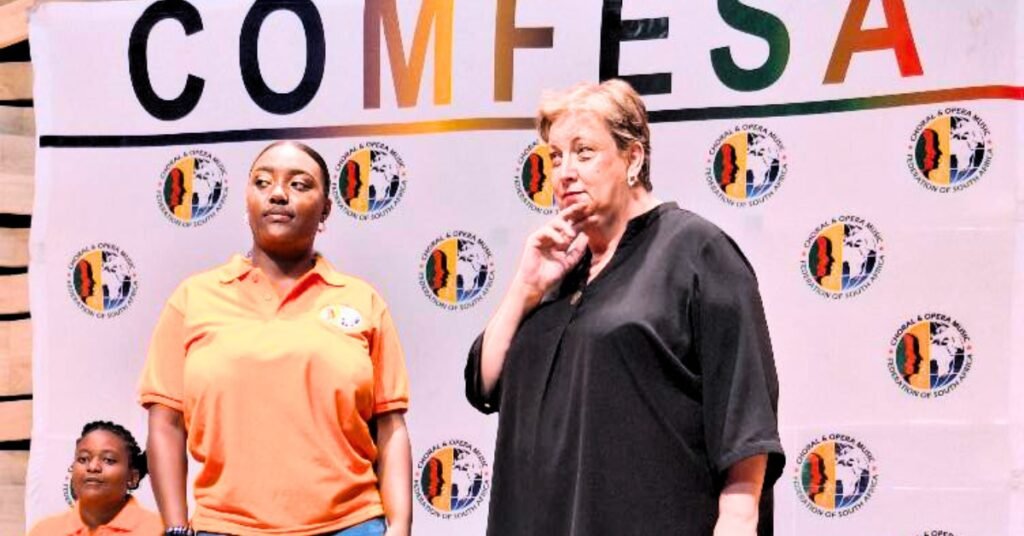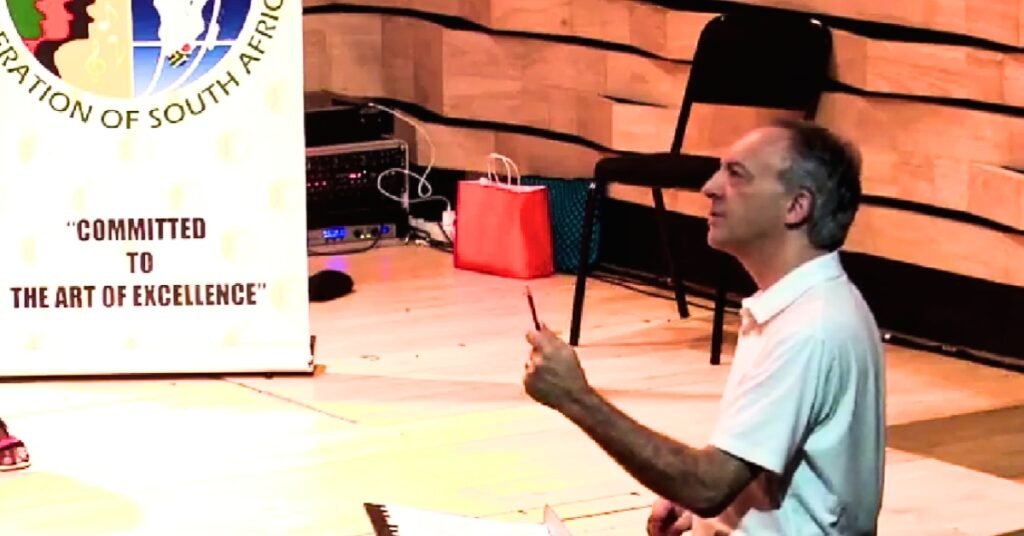As a beloved figure in South Africa’s choral music scene and a distinguished professor at North West University, Professor Santisa Viljoen brought her wealth of knowledge and passion for music to the COMFESA International Symposium in Gauteng. Her involvement underscored COMFESA’s commitment to showcasing the brilliance of female professionals in our sector. Through her masterclasses, Professor Viljoen not only imparted technical skills but also nurtured a profound connection between body, mind, and spirit in the art of singing.
Masterclass with Priya Ndlovu and Neo Moatshe

Priya Ndlovu and Neo Moatshe’s duet of “Pie Jesu” by Andrew Lloyd Weber was a beautiful opening to the series of masterclasses. Professor Viljoen noted, “Singing happens inside the body – we can’t see it, we can feel it,” underscoring the importance of internalizing the music. She stressed the need for a physical manifestation of the abstract aspects of vocal performance, utilizing tools like a scarf to help singers “get into their bodies and out of their heads.”
Reflecting on the duo’s performance, she encouraged self-assessment, asking, “What did you like about your performance?” This question not only prompted introspection but also highlighted the necessity of warm-ups, with Viljoen reminding us, “An athlete cannot run without warming up, a singer can’t sing without warming up.” The duo’s interaction also brought to light the significance of communication in ensemble singing, with Viljoen advising, “You’re singing a duet but you’re not communicating. In ensemble work, there has to be that closeness. Vowel connection. A meeting of the souls.”
Emmanuel Maqoma: Delving Deep into “La Calunnia”
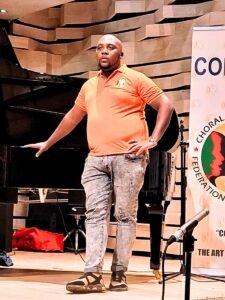
Emmanuel Maqoma’s engagement with “La Calunnia” offered a captivating study on the intricacies of character portrayal and vocal technique. Professor Viljoen’s approach went beyond the surface, probing into the heart of character interpretation. She asked, “Who is your character?” prompting Emmanuel to explore the psychological depth of his comic role as the cunning, opportunistic Don Basilio. Her insight into the alignment of a singer’s age with the character’s vocal maturity also provided a nuanced perspective on casting decisions in opera.
Addressing the lyrical density of the aria, Professor Viljoen introduced practical techniques for mastering the text, emphasizing the importance of articulation and diction and praising Maqoma’s attention to these aspects of his performance. She illustrated how physical engagement – through the strategic use of props like a ball – could enhance his vocal performance. This hands-on method underscored the interplay between physicality and vocal expression.
Banele Nqai: Mastering Technique and Expression in “O mio babbino caro”
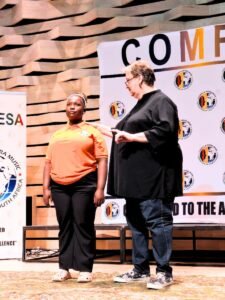
Banele Nqai’s interpretation of “O mio babbino caro” became a canvas for Professor Viljoen to explore the subtleties of vocal technique and language. Noting that Banele already possessed a “beautiful instrument,” which “God gave with both hands,” she emphasized the critical role of posture in achieving vocal freedom, highlighting how physical alignment affects vocal output.
The masterclass also delved into the challenges of Italian pronunciation, where Professor Viljoen shared valuable insights into the nuances of articulation, particularly the treatment of consonants and vowels in the Italian operatic repertoire. She remarked “”When Italians write ‘r’, they mean three ‘r’s,” and offered tips to help Banele navigate the complexities of the language.
Through engaging exercises designed to encourage breath control and physical relaxation, Professor Viljoen shared techniques to further enhance Banele’s high notes. These included posture and visualization strategies, such as imagining oneself reaching great heights, and creating space within the body to expand vocal capacity and expression.
Siphiwe Mkhatshwa: A Journey Towards Self-Confidence and Modernity

Siphiwe Mkhatshwa’s session stood out as a testament to the power of self-awareness and the embrace of contemporary interpretations in classical music. Reflecting on his performance of Quanto è bella, quanto è cara, Professor Viljoen focused on building Siphiwe’s confidence, encouraging him to recognize and vocalize his strengths, “It’s difficult for people to say ‘I like this about myself,’ but it’s actually very important because you need a heavy amount of confidence to do this.”
Furthermore, Professor Viljoen guided Siphiwe through the process of reimagining classical pieces for today’s audiences, balancing respect for traditional interpretations with the need for modern relevance. She offered strategies for connecting with contemporary interpretations while remaining true to the character’s core, ensuring that Siphiwe’s performance resonated both historically and emotionally.
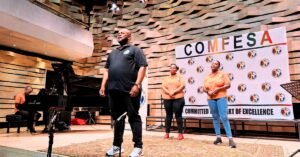
Through these masterclasses, Professor Santisa Viljoen did more than teach vocal technique; she fostered a holistic approach to singing that resonates deeply with all who were present. Her ability to connect physicality with emotional expression and intellectual understanding is a gift to aspiring singers. We invite everyone to experience the depth of her teachings on our Facebook page, where her masterclasses serve as a resource for all those seeking to elevate their vocal artistry in choral music.

